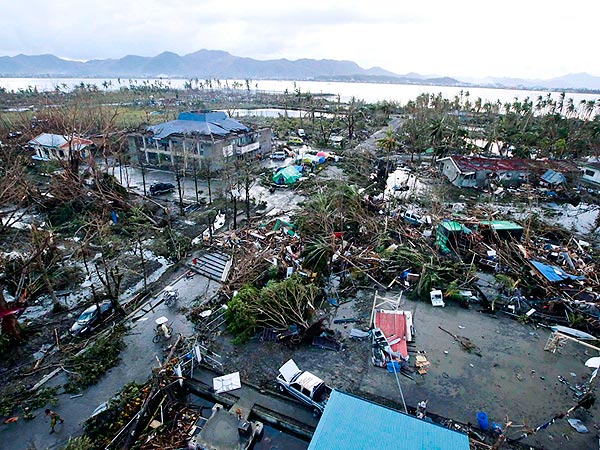skip to main |
skip to sidebar
Philippines is calling SOS,help wanted!
FOR once it was no metaphor but the real thing—a perfect storm in terms of its sheer size, its circular symmetry and the tightness of its eye. When it hit land, in Leyte and Samar provinces in the Philippines, Typhoon Haiyan’s ferocity set records. Sustained winds were 250 kilometres (160 miles) an hour with gusts of over 300kph—like standing behind the revving engine of a jumbo jet. But it was a 5-metre (16-foot) storm surge—an intense low pressure at the storm’s centre sucking the sea level upwards—that caused the worst damage. 
HELPHaiyan’s victims have so far received scant help. City and provincial governments have been paralysed. Even in Tacloban, where the airport is now partly working again, food, clean water, medical treatment and shelter have yet to reach many of the worst-hit. Poor sanitation, a lack of medicines and stagnant water pose a further health threat. Even five days after the catastrophe, there were few signs of authority in many stricken areas except for a few troops. The Philippine government promises that this is about to change. Outsiders, led by a growing American military operation involving marines and helicopters, are also gearing up to provide large quantities of aid.

The scale of this catastrophe was unusual, but natural disasters are sadly familiar in the Philippines. It has among the world’s highest incidences of earthquakes and volcanic eruptions. Landslides, often triggered by deforestation, have pushed more people to the low-lying coast, where many eke out a living by fishing. Climate change may exacerbate the Philippines’ vulnerability: the country lies in a region where sea levels are rising faster than elsewhere, and global warming may be increasing the dangers of tropical storms (see article).

Yet however susceptible the Philippines is, there is much that it and countries like it, such as next-door Indonesia, can do to build resilience in the face of natural catastrophes.First, economic growth. Under the popular Mr Aquino, growth has been strong, but the gains are not evenly spread. Leyte and Samar are among the poorest provinces. Had more people lived in robust housing instead of shanty towns by the shore, fewer lives would have been lost. Politics is a chief reason why the poor are not better off. In the Philippines a patron-client system of political power is sustained by pork-barrel spending. It breeds endemic corruption and it entrenches powerful families with little incentive to improve the lives of ordinary Filipinos. Mr Aquino has promised to change this, but has more to do. Meanwhile, the central government’s writ remains pitifully small.




